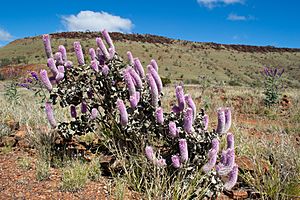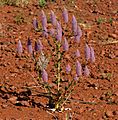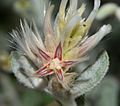Ptilotus facts for kids
Quick facts for kids Ptilotus |
|
|---|---|
 |
|
| Ptilotus rotundifolius (F.Muell.) F.Muell. | |
| Scientific classification |
|
| Kingdom: | Plantae |
| Clade: | Tracheophytes |
| Clade: | Angiosperms |
| Clade: | Eudicots |
| Order: | Caryophyllales |
| Family: | Amaranthaceae |
| Subfamily: | Amaranthoideae |
| Genus: | Ptilotus R.Br. |
| Species | |
| Synonyms | |
|
|
Ptilotus (say "TILL-oh-tus") is a group of about 120 different kinds of plants. These plants can be small herbs or larger shrubs. They can live for just one year (annual) or many years (perennial). All these plants belong to the Amaranthaceae family, which also includes plants like spinach and quinoa.
Most Ptilotus plants grow naturally in Australia. One type, Ptilotus spathulatus, is also found in Tasmania. Another, Ptilotus conicus, grows on islands like Flores and Timor in a region called Malesia. Many different kinds of Ptilotus are found in Western Australia, especially in a rocky area called the Pilbara.
People often call these plants by fun names like mulla mulla, foxtails, pussy tails, and lamb's tails. This is because their flowers often look soft and fluffy, like an animal's tail. A botanist named Robert Brown first officially described this group of plants in 1810. Scientists have studied Ptilotus and found it is closely related to another plant group called Aerva. If you want to identify different Ptilotus species, there's a special online tool called KeyBase.
Types of Ptilotus Plants
There are many different types, or species, of Ptilotus plants.
Protecting Ptilotus Plants
Some Ptilotus species are rare or at risk of disappearing. In Western Australia, several are listed as threatened or priority flora. This means they need special protection to help them survive.
Here are some of the Ptilotus species that are being watched or protected:
- Ptilotus actinocladus
- Ptilotus alexandri
- Ptilotus andersonii
- Ptilotus beardii
- Ptilotus blackii
- Ptilotus caespitulosus (This one is thought to be extinct, meaning it no longer exists.)
- Ptilotus chortophytus
- Ptilotus chrysocomus
- Ptilotus clivicola
- Ptilotus crispus
- Ptilotus crosslandii
- Ptilotus daphne
- Ptilotus falcatus
- Ptilotus fasciculatus
- Ptilotus lazaridis
- Ptilotus luteolus
- Ptilotus marduguru
- Ptilotus mitchellii
- Ptilotus mollis
- Ptilotus procumbens
- Ptilotus pyramidatus (This one is officially declared rare.)
- Ptilotus rigidus
- Ptilotus sericostachyus subsp. roseus
- Ptilotus subspinescens
- Ptilotus tetrandrus
- Ptilotus trichocephalus
- Ptilotus wilsonii
- Ptilotus yapukaratja
Gallery
See also
 In Spanish: Ptilotus para niños
In Spanish: Ptilotus para niños
 | Claudette Colvin |
 | Myrlie Evers-Williams |
 | Alberta Odell Jones |













